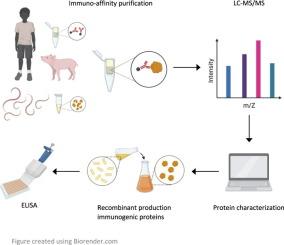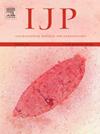利用免疫蛋白组学方法鉴定蛔虫肺期幼虫的免疫原性蛋白:用于重组人与猪血清诊断分析。
IF 3.2
2区 医学
Q1 PARASITOLOGY
引用次数: 0
摘要
土壤传播的蠕虫病被世界卫生组织确认为20种被忽视的热带病之一,主要影响热带和亚热带地区社会经济不利的社区。在四种土壤传播的蠕虫中,蛔虫最为普遍,影响全球7亿多人。目前,蛔虫病的诊断标准是基于粪便的显微镜检查,这面临着重要的局限性。尽管血清学诊断是一种很有前途的替代方法,但目前经过良好验证的商业血清学诊断的前景令人警醒。基于猪蛔虫肺期幼虫匀浆的ELISA (AsLungL3-ELISA)显示了为人类和兽医预防和控制蛔虫病规划提供重要信息的潜力。因此,本研究旨在鉴定蛔虫肺期幼虫匀浆中的免疫原性蛋白,并研究对这些蛋白重组表达版本的抗体反应。考虑到基于重组的分析在人类和兽医应用方面的潜力,该研究包括涉及人类和猪的实验。首先,免疫亲和纯化与液相色谱-串联质谱相结合,得到三个免疫原性蛋白列表(用于儿童、成人和猪)。为了验证这一概念,在大肠杆菌中重组产生了四种有希望的免疫原性蛋白(多蛋白ABA-1、副肌球蛋白、载脂蛋白和S60核糖体蛋白),并使用ELISA评估了对这些重组蛋白的抗体反应。虽然猪的结果由于抗体的非特异性结合而不确定,但检测IgG4的潜在人类血清诊断应用的发现似乎很有希望。多蛋白ABA-1和副肌球蛋白的OD值在AsLungL3-ELISA阴性和阳性的儿童和成人之间有显著差异。总之,这项研究为开发新的血清诊断方法奠定了基础,并证明重组蛋白生产提供了一种有效的方法来生产诊断蛔虫抗原,而不需要在猪身上进行研究。本文章由计算机程序翻译,如有差异,请以英文原文为准。

Identification of immunogenic proteins of Ascaris lung stage larvae through immunoproteomics: towards recombinant-based serodiagnostic assays for humans and pigs
Soil-transmitted helminthiases are recognised by the World Health Organization as one of the 20 neglected tropical diseases, primarily affecting communities with socioeconomic disadvantages in tropical and subtropical regions. Of the four soil-transmitted helminths, Ascaris stands out as the most widespread, affecting more than 700 million people globally. Today, the diagnostic standard for ascariasis is based on microscopic examination of stool, which faces important limitations. Although serological diagnosis is a promising alternative, the current landscape of well-validated commercial serological diagnostics is sobering. An ELISA based on homogenate from Ascaris suum lung stage larvae (AsLungL3-ELISA) showed significant potential to inform human and veterinary prevention and control programs against ascariasis. Therefore, this study aimed to identify the immunogenic proteins in Ascaris lung stage larval homogenate and investigate the antibody response towards recombinantly expressed versions of these proteins. Given the potential of recombinant-based assays for both human and veterinary applications, the study encompasses experiments involving both humans and pigs. First, immuno-affinity purifications were coupled with liquid chromatography-tandem mass spectrometry, resulting in three lists of immunogenic proteins (for children, adults, and pigs). As a proof of concept, four promising immunogenic proteins (polyprotein ABA-1, paramyosin, apolipophorin and an S60 ribosomal protein) were recombinantly produced in Escherichia coli and the antibody response against these recombinants was evaluated using ELISA. While the results for pigs were inconclusive due to non-specific binding of antibodies, the findings for potential human serodiagnostic applications detecting IgG4 appeared promising. For both polyprotein ABA-1 and paramyosin, a notable difference in OD values was observed between children and adults who were AsLungL3-ELISA negative and positive. In conclusion, this study is a steppingstone towards the development of new serodiagnostic assays and demonstrates that recombinant protein production offers an efficient method to produce diagnostic Ascaris antigens without requiring pig studies.
求助全文
通过发布文献求助,成功后即可免费获取论文全文。
去求助
来源期刊
CiteScore
8.40
自引率
2.50%
发文量
76
审稿时长
23 days
期刊介绍:
International Journal for Parasitology offers authors the option to sponsor nonsubscriber access to their articles on Elsevier electronic publishing platforms. For more information please view our Sponsored Articles page. The International Journal for Parasitology publishes the results of original research in all aspects of basic and applied parasitology, including all the fields covered by its Specialist Editors, and ranging from parasites and host-parasite relationships of intrinsic biological interest to those of social and economic importance in human and veterinary medicine and agriculture.

 求助内容:
求助内容: 应助结果提醒方式:
应助结果提醒方式:


